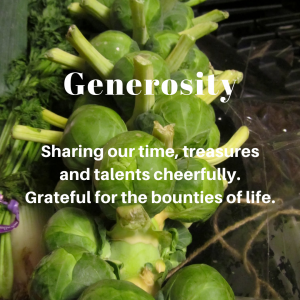
Strengthen Your Family with Generosity
Generosity within the family is much more than mere acts of giving; it forms the backbone of stronger emotional bonds, trust, and mutual respect among family members. Let’s explore how generosity strengthens family life through tangible and intangible examples, demonstrating its profound impact on nurturing a loving and supportive home environment.
Emotional Generosity: Listening and Support
One of the most significant forms of generosity is the gift of understanding and emotional support. Consider a family where members actively listen to each other, offering a shoulder to lean on during challenging times. For instance, a teenager struggling with academic pressures might find solace in a parent’s empathetic ear. This form of generosity doesn’t cost anything but time and attention. Yet, it immensely strengthens the bonds between family members, providing a safe space where each person feels valued and understood.
Generosity of Time: Shared Moments
Time is a precious commodity in our fast-paced world, and dedicating it to family activities is a powerful form of generosity. A simple act like parents setting aside their work to attend their child’s school play or sports game sends a strong message of care and priority. Furthermore, planning family outings or engaging in home activities like game nights or cooking together helps build fond memories. It deepens relationships, showing that the most valuable gift one can offer is often one’s undivided attention.
Material Generosity: Sharing Resources
While emotional and time-based generosity is crucial, sharing material resources within the family also plays a vital role. This might look like siblings sharing clothes and toys or parents saving to help fund their child’s education. Another example is when family members help each other financially during tough times, such as contributing to a relative’s medical bills. These acts of material generosity provide immediate help and reinforce a sense of mutual support and collective well-being within the family.
Generosity of Knowledge and Skills
Sharing knowledge and skills is another splendid way to practice generosity in a family setting. An older family member, like a grandparent, passing down family recipes or life lessons to younger generations is a priceless gift. Similarly, siblings teaching each other skills—helping with homework, teaching a musical instrument, or sharing tips on digital technology—enhance each other’s lives and promote a culture of lifelong learning and gratitude.
Forgiveness: A Generous Act of Love
Generosity is also profoundly expressed through forgiveness. Family life is inevitably filled with conflicts and misunderstandings. The willingness to forgive, overlook flaws, and move forward without holding grudges is one of the most challenging yet rewarding acts of generosity. This resolves conflicts and models important values of compassion and resilience to younger family members.
Encouraging Generosity in Children
Parents and guardians play a pivotal role in cultivating generosity among children. They can encourage this behavior by modeling it themselves. Children who see their parents engaging in acts of kindness within and outside the family are more likely to adopt these behaviors. Encouraging children to participate in family decisions, like choosing charitable causes to support or helping in community services, further instills the values of generosity and empathy.
Generosity in its many forms is essential for fostering a healthy, supportive, and connected family life. It goes beyond material gifts to encompass the generosity of time, knowledge, emotional support, and forgiveness. No matter how small, each act of generosity contributes to building a resilient family foundation, setting a virtuous cycle of kindness and giving that can extend well beyond the family and into the community. As families continue to embrace and practice generosity, they strengthen their bonds and contribute to building a more compassionate world.
How is your family developing the virtue of generosity? Is it an area of growth, or is it well-developed? Is this a virtue that is overdeveloped or underdeveloped in your family life? For a deeper look at determining, see this article, Balancing Generosity in Family Life
Joe is a husband, father, grandfather, author, speaker, educator, course creator, and parent/family coach.
He helps parents develop unity, find clarity, communicate, and develop consistency in their parenting with the Four C’s of Successful Families. You can find his work on social media.
In addition, the Four C’s newsletter is enjoyed by many as it encourages parents to self-care, build their relationships with their partners, and raise their children.
And he loves to golf!







